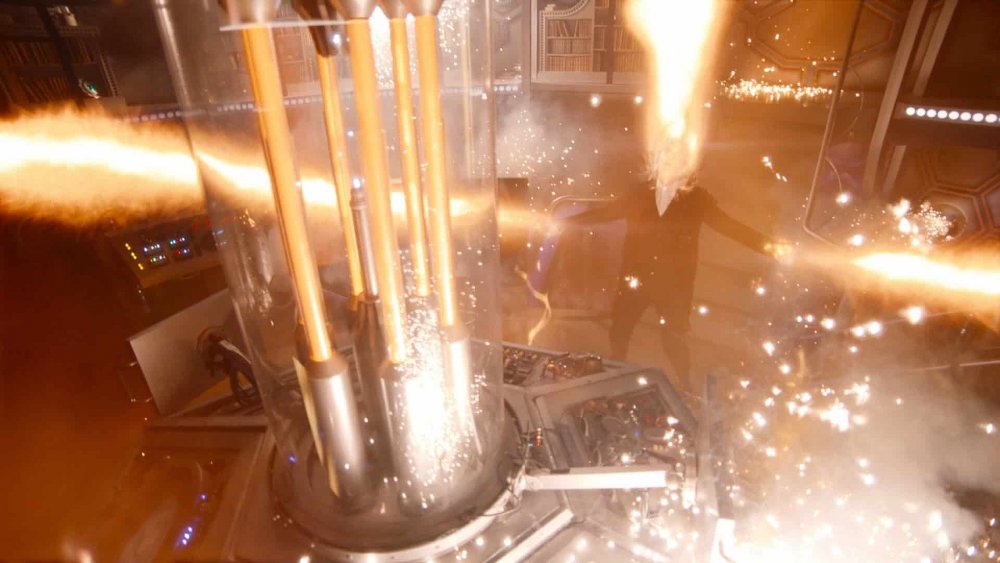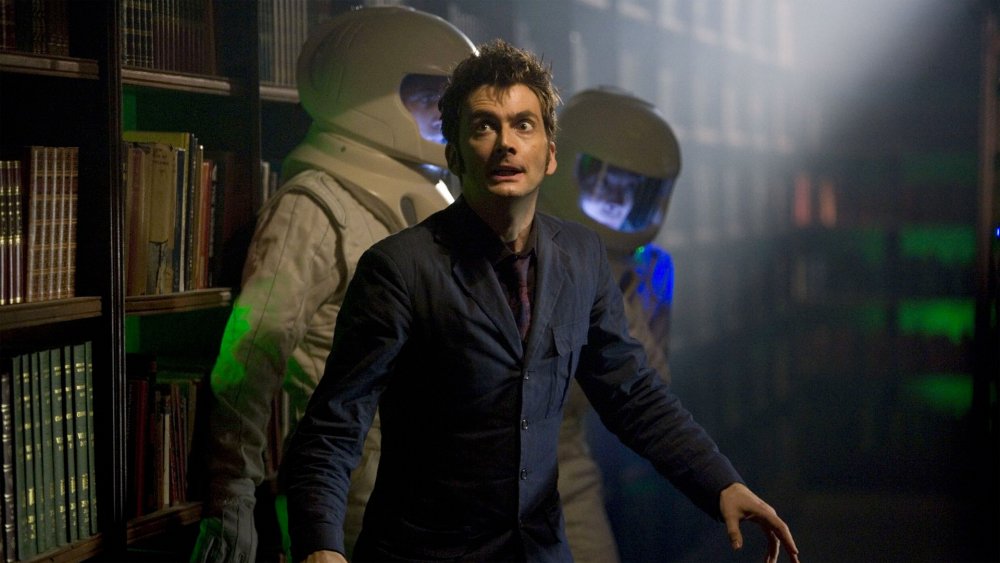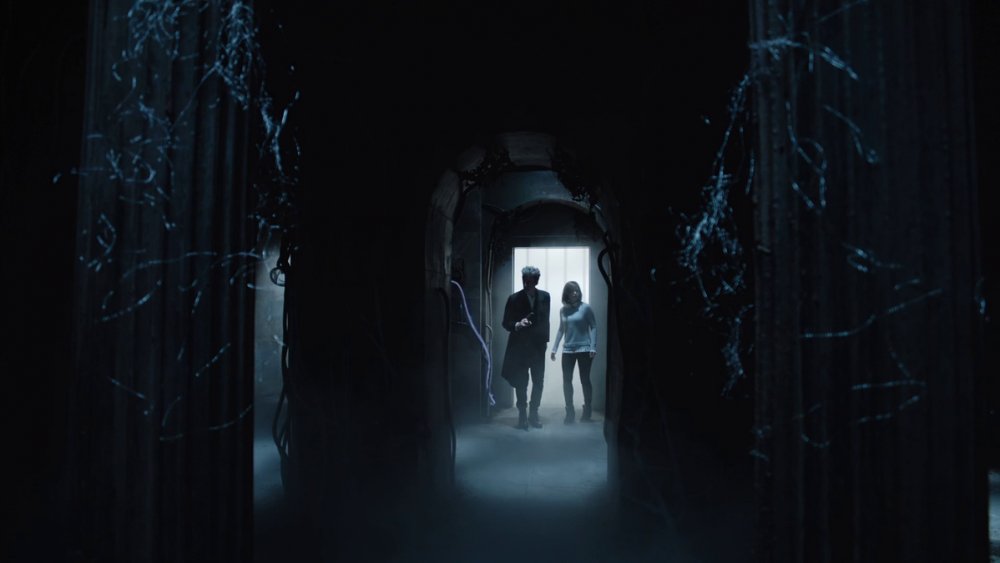The Reason Doctor Who Fans Think The Doctor Hides Their Name
There's a running joke from the 1999 Steven Moffat-written Doctor Who Red Nose Day comedy relief sketch "The Curse of the Fatal Death" which sends up the fact that the series sometimes makes little sense. In fact, the more one tries to explain the time travel, the aliens, and the life of the Doctor, the less sense things tend to make.
In "The Curse of the Fatal Death," whenever the Doctor is asked to explain something strange (why are there chairs on a Dalek ship, for instance), the Doctor responds by saying, "I'll explain later."
For everything we know about Doctor Who, there are countless other things we either don't know at all, or used to know until the half-century-old series changed the rules. Who commands the Daleks? What planet are the Cybermen from? How many incarnations of the Doctor are there, really? The facts change all the time.
One of the biggest questions is, well, "Doctor who?" Fans have been thinking about this question since 1963. Not only do we wonder what the Doctor's name is, but we also wonder what makes it such a big secret.
The Doctor's name and what it means so far
In the interest of Doctor Who transparency, there is an argument to be made that the Doctor's name was uttered aloud for Whovians to hear on precisely one occasion during Tom Baker's time as the Fourth Doctor. During the the serial "The Armageddon Factor," The Doctor encounters an old acquaintance named Drax whom he knows from back in his days at Time Lord Academy. Drax calls the Doctor "Theta Sigma." Whether "Theta Sigma" is a name or a designation remains unclear, but it's relevant that a Time Lord would be the one to speak the Doctor's name aloud.
During the modern era of Doctor Who, the question of the Doctor's name comes up quite a lot. Although it is never spoken loud enough for the audience to hear, River Song (Alex Kingston) whispers the Doctor (David Tennant) his own name in an episode called "Forest of the Dead." The Doctor's response to River is one of absolute shock.
Later in the episode, at the moment of River Song's death (one of them, anyway), the Doctor tells River, "There's only one reason I would ever tell anyone my name. There's only one time I could." For a time, the presumption was that the Doctor could only speak their name when they're getting married. In "The Wedding of River Song" we think the Doctor (Matt Smith) has shared his name with River, but it's later revealed that he actually hasn't. Long story short: the Doctor lies.
Recently, fans have hypothesized that the reason why the Doctor never speaks their own name is for their own safety. And the hypothesis also suggests that the only occasion for which a Time Lord would reveal their name is at the moment of their final death.
Doctor Who, Time Lords, and the Matrix
In a thread on Reddit's r/doctorwho board questioning the reason why the Doctor hides their name, user Rtozier2011 explained their own "headcanon": "Achieving Time Lord consciousness supplants original Gallifreyan identity, and regeneration downloads Time Lord consciousness into a new body." Translation? "A Time Lord can only reveal their original name to someone at the moment of their own death without regeneration."
If you want a little extra meat to that explanation, Rtozier2011 added that "this would be a Time Lord fail-safe mechanism to prevent any Time Lords being vulnerable to a personal attack on their pre-existing Gallifreyan identity, which might compromise the Academy."
Let's unpack all of that with what we currently believe we know about Time Lords. First of all, not everyone from the planet Gallifrey is a Time Lord, and Time Lords did not always have the ability to regenerate. Regeneration comes from a mysterious "Timeless Child" from another universe whose ability to regenerate was added to Time Lord physiognomy through science.
There is one other element of Time Lord science which needs to be accounted for: the Matrix. The Matrix on Gallifrey is a simulated reality environment, and the sum of all Time Lord experiences and memories are perpetually being uploaded into the Matrix. In a way, even after a Time Lord's final death, their consciousness lives on within the Matrix. It can be used not only to store information about the past, but as an algorithm to predict the future.
For all its power and information, the Matrix is not infallible. People can hack the Matrix, access its information, and even manipulate it. This is where the "name" situation comes into play.
Time Lords, The Timeless Child, and Rumpelstiltskin
Think of Time Lords as being like Rumpelstiltskin — to know a Time Lord's name is to have power over them. If someone were to know the Doctor's true name, for instance, they could hack the Matrix, look them up in the Gallifreyan White Pages, and have full access to the Doctor's memories. With that ability, someone could find out any forbidden knowledge the Doctor has, rewrite the Doctor's memory to make them a different person, or erase the Doctor's memories entirely, thus preventing the Doctor (or any Time Lord) from having their memories post-regeneration.
This theory fits in with what we know about Doctor Who reasonably well, at least insofar as it impacts Time Lords other than the Doctor. It's likely that this theory would mean that "Theta Sigma" is merely a designation and not the Doctor's full name, but that's not a cannon-breaking suggestion.
The only real hang-up in the theory relates to the Timeless Child plot thread introduced during Jodie Whittaker's time playing the Doctor. If the Doctor is not a Time Lord but an entirely different species that can regenerate indefinitely, it stands to reason that the Doctor doesn't require the Matrix to retain their memories. That being said, we do know the Doctor's memories are in the Matrix, so it would still be pretty catastrophic if someone were to sneak in and find out all the Doctor's secrets.
In the end, the theory that a Time Lord's name holds power worth protecting makes sense if you know all of these little fun facts about the lore of the show. Even if you don't know every detail, the fun of theories like this one is that they afford an excuse to rewatch Doctor Who.



